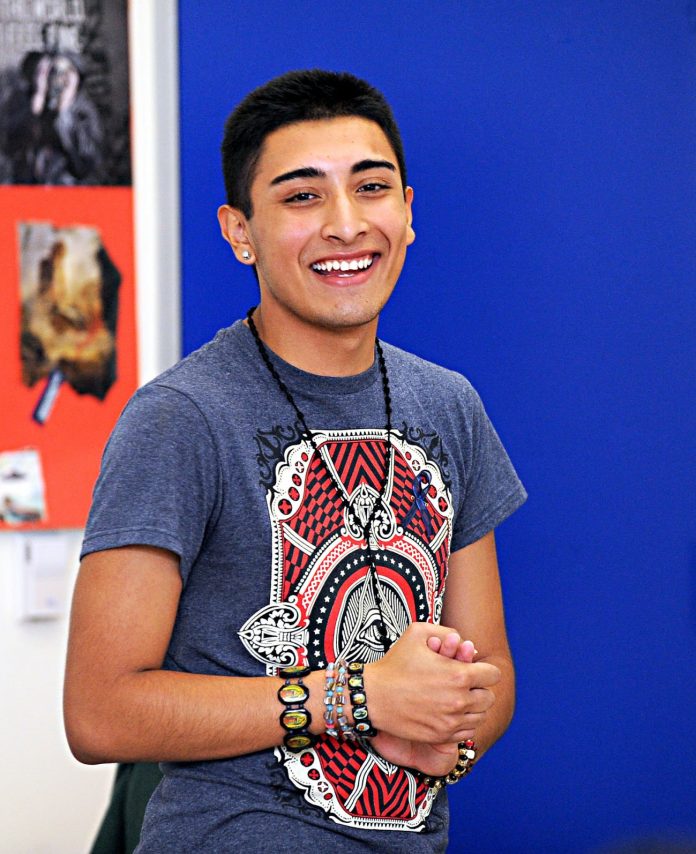
“Every day I put a smile on,” said David Galindo, tugging at the bottom of his sweater as he spoke to a classroom full of students. “I’ll be happy at school and at home, but at night when everyone is sleeping I feel myself slowly starting to get depressed. I look outside at the stars and sometimes I just wish I could disappear because I feel like no one cares.”
Galindo, a junior, was one of several Gilroy High School students who, instead of bowing to threats of reprisal for speaking out, found the courage to share their stories about bullying to the newly minted Anti-Bullying Club on Sept. 25.
Club founders Valerie Cejas and Morgan Howard, juniors at GHS, are on a quiet crusade to end bullying—and their voices are getting louder as others join the fight.
Approximately 20 students, a mix of all four grades, as well as English teacher Janet Lavelle and Howard’s mother, Melissa, assembled in room B20 for the club’s inaugural meeting.
“We were nervous all day, wondering ‘what if people don’t show up?’” Cejas said. “It was great; it was better than we thought. I love that people expressed themselves to us and I felt like I was opening up, too.”
“I just want the awareness of the problem,” added Morgan. “I want people to come together.”
Some students tried to stop the club before it started and tore down and stomped on its posters, behavior Morgan called “typical.” But sharing tales of those types of actions helped unite the students.
Guest speaker and Gilroy High senior, Ricardo Cano, kickstarted the discussion by sharing his own experiences of bullying—both at school and at home—for being gay.
Cano said he wasn’t into “macho” activities growing up, and not everyone in his family approved. Family members attempted to “fix” him by putting him in a religious program.
Cano came to this country at 15 and barely spoke any English. Though he was born in San Jose and raised in Mexico, he said he was bullied by classmates who often called him a “beaner.”
At home, Cano often receives criticism from a certain family member. But while it used to upset him, at first, the senior said he’s learned to put his own happiness first.
“If your family doesn’t like you, which is my case, it’s fine,” Cano said. “I believe that if you want to love someone else, you have to love yourself first. I’m proud of who I am and I’m going to keep going.”
Cano later translated for another student who had moved to Gilroy from Mexico and struggled with speaking English. At 5 years old, this student said he contemplated suicide as a means to ending after-school beatings from gang members. Though his friend stepped in and stopped him before he took action, thoughts of the day he almost ended his life still haunt him.
One of the club’s main objectives is to help students cope with bullying instead of turning to drugs, alcohol or suicide, which is too often the case, according to Melissa, who works with an anonymous program for troubled young adults.
Bullying ranges from students such as Cejas and Morgan being called “whores” to others being called a “faggot.” Others are teased because of their weight or the way they dress.
Several speakers shared experiences in which they witnessed teachers being bullied, and said they felt powerless to stop it because they feared the focus would shift to them if they spoke up.
“It comes from everywhere; there’s certain kids who haven’t broken cycles,” Melissa said. “Bullying has always been around. I’m not a spring chicken; I got bullied so much as a child. The names that I got called and the despair and just wishing I was in a black cape and I could hide and no one could see me when I went to school. No one should feel that way.”
Lavelle shared her story, too. She still remembers the names she was called by a group of girls in eighth grade.
“I can remember at that age the pain that I felt—I can still feel it now,” Lavelle said. “Look at all the bullying that goes on in today’s world. Teachers get bullied, football players get bullied. Everybody gets bullied in some capacity. This touches everybody’s life.”
Cejas and Morgan are making sure their peers have a safe haven both in the classroom and outside of it. They exchanged numbers with club members and offered to be there to lend an ear or a shoulder to cry on when they need it.
“We’re all friends now,” Cejas said.
As for those doing the bullying, they’re welcome, too.
“A lot of people were telling us that we’d get beat up for starting the club and that we’d get picked on even more,” Morgan said. “I’m still going to do it, it’s what I believe in.”
“That’s the whole point. We did see some posters on the floor, but it’s OK. They can do that; we’re still here. We will be here helping each other and they will be alone, but we’ll still accept them.”
Gilroy High’s next Anti-Bullying Club meeting is Oct. 16 from 3-4 p.m. in room B20.














